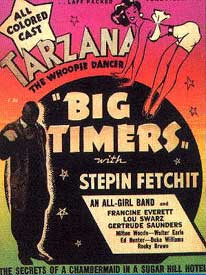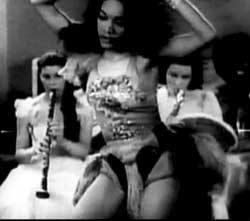 A no-budget musical comedy about thirty-six minutes long, Big Timers (1945) is set in a Sugar Hill residential hotel where wealthy African Americans live. A prefacing text states that the film is about the clash of rich with the poor, the latter serving them as porters & maids. No actual clashing occurs, but there is a class theme running through the tale in a lighthearted manner.
A no-budget musical comedy about thirty-six minutes long, Big Timers (1945) is set in a Sugar Hill residential hotel where wealthy African Americans live. A prefacing text states that the film is about the clash of rich with the poor, the latter serving them as porters & maids. No actual clashing occurs, but there is a class theme running through the tale in a lighthearted manner.
The area only was not known as Sugar Hill until the 1920s when affluent African Americans began moving there. It meant that whoever lived there lived a sweet life. Harlem's physicians, lawyers, business tycoons, entertainers, & the literati were the ideal Sugar Hill citizens, though the the families of gangland bosses & gamblers also called it home. And they each & every one required the further proof of sweetness -- servants.
While young Betty Washburn (Francine Everett) was out of town to a singing event, she met a young man, Tom (Duke Williams), who just assumed she came from a wealthy family like his own, since she had a classically trained voice. She let him believe whatever he wanted. When they became more serious, she was stuck with this lie of omission.
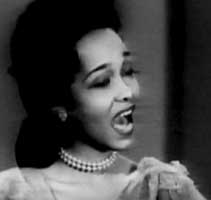 Now he's coming to New York city & bringing his mother & father to meet the girl he wants to marry. She runs to her mother in tears because Tom & his family are expecting them to be residents of the Sugar Hill hotel, when Betty's mom is actually a maid. Now he's coming to New York city & bringing his mother & father to meet the girl he wants to marry. She runs to her mother in tears because Tom & his family are expecting them to be residents of the Sugar Hill hotel, when Betty's mom is actually a maid.
Betty swears she's not ashamed of her mother, but more of herself for letting this lie get away from her. And she does admit she fears the class differences will come between her & Tom.
Her mother Cora (Lou Swarz) decides to help her daughter disguise her class position. Cora is the charwoman for wealthy performer Mable Page (Gertrude Sanders), who has locked up the apartment & set out for a USO performance. The timing looks right so Cora fixes the place up to look like she & her daughter live there.
The little family gathering is going over quite nicely, & Betty sings a jazz ballad, "If It Isn't Love." Though afflicted by the film's bad sound system, Francine Everett has a fine voice, & is certainly a great beauty for this role. In the black community, she was as well known a star as Lena Horne or Dorothy Dandridge, though she'd had relatively little exposure to white audiences.
Even as Betty's singing, Mable Page is at the door of her own home, having returned unexpectedly. It looks like Cora & Betty will be unmasked as servants posing as the masters. But Cora apologizes profusely & explains in whispers why she did it.
Far from being angry or annoyed, Miss Page is rather amused by the situation & decides to help out. She wants to get her entire USO show together to give the visiting Tom & his parents a real Sugar Hill party. The rest of the film is going to be a little musical review.
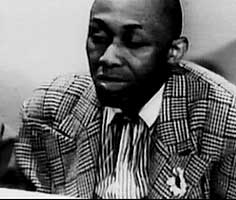 From that plot outline you'd never know the actor with top billing is Stepin Fetchit, who is in on the harmless swindle acting as Cora's porter throughout the film. Curiously, though, while Mable Page is introducing the various acts in her troupe, she realizes who "Porter" really is, & introduces him thus:
From that plot outline you'd never know the actor with top billing is Stepin Fetchit, who is in on the harmless swindle acting as Cora's porter throughout the film. Curiously, though, while Mable Page is introducing the various acts in her troupe, she realizes who "Porter" really is, & introduces him thus:
"Ladies & gentlemen, we have another surprise for you, a celebrity of screen, stage, & radio. And it's none other than the porter." Stepin Fetchit then performs a rap-song in syncopated rhyme, in his mumbling manner, regarding a guy who lives with a cat that has just run off with his porkchop.
Stepin Fetchit reveals more of his comedic charm in this film than is usually the case. In films when he does his shuckin' laziness routine with an otherwise white cast, the stereotype is agonizing & repellant, though apparently funny to most folks of any race once upon a time.
In Big Timers, he's not the sole representative of what it means to be a black person, plus his character is at least a tiny bit more nuanced.
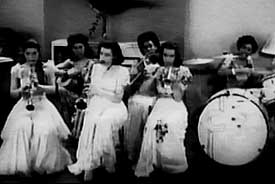 Still, working within the shiftless negro framework of the Stepin Fetchit character, he soon works up an alleged sweat from about six seconds of doing the soft-shoe, while the All American Girl Band plays the instrumental "Start Swingin" behind him. He calls in an extremely short bellboy assistant to help him wave goodbye because he can't lift his own arm without assistance he's so weary. Still, working within the shiftless negro framework of the Stepin Fetchit character, he soon works up an alleged sweat from about six seconds of doing the soft-shoe, while the All American Girl Band plays the instrumental "Start Swingin" behind him. He calls in an extremely short bellboy assistant to help him wave goodbye because he can't lift his own arm without assistance he's so weary.
I have trouble stomaching Stepin Fetchit in most of his films. But seeing him in his original "chitlin circuit" context as a black entertainer for black audiences, the charm he once had for black audiences is slightly easier to perceive.
I do think it unfortunate he never stepped outside the Stepin Fetchit persona to reveal his actual range of acting & humor potential. It's also unfortunate that as the first black entertainer to become a millionaire off his profession, he should even so end up bankrupt & maligned as the arch symbol of how blacks could be misrpresented by comedians insulting their own race for filthy lucre, an attitude that arose with consciousness raising & black pride & against which sentiment the comedian rebelled.
In reality it was acceptible humor before activists succeeded in raising greater self-awareness in the black community. It's only too bad that minstrelsy-inspired comics were cast aside with such extreme harshness & blame.
If he'd been a little smarter, when his type of humor waned, he'd've reverted to his actual name of Lincoln Perry & changed his act. Instead he reacted to the hostility toward his once-beloved act with increased insistance that there was nothing wrong with it. Therefore he died with none of the love or admiration the public once had for him, without even that filthy lucre to show for it. And that's a shame.
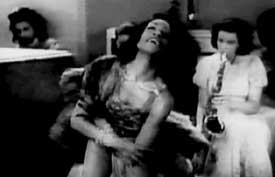 Stepin Fetchit got first billing because his name guaranteed boxoffice in 1945. Even so, the real stars are the acts introduced by the character of Mabel. One is "the boy with the crazy feet" who dances to the All American Girl Band's swing jazz.
Stepin Fetchit got first billing because his name guaranteed boxoffice in 1945. Even so, the real stars are the acts introduced by the character of Mabel. One is "the boy with the crazy feet" who dances to the All American Girl Band's swing jazz.
The dancer as well as the all-girl band by their talent surely had careers & followings in the black community entertainment venues, but there's blessed little about who they are.
There was another "All American Girl Band" that was all white, & I can't find reference to this black seven-piece all-girl orchestra for anything but this film.
It's possible they were more associated with burlesque houses which especially in Harlem were places of quality entertainment, as can be further ascertained from Burlesque in Harlem (1954) encountered on one release of Big Timers as a dvd double-bill.
Although the array of entertainers shown are said within the film to be part of a USO show, they could also pretty much all but Francine have been burlesque house comics, singers, & musicians, which would explain why it was promoted with burly-q Tarzana's name above even that of Stepin Fetchit (as in the poster at the top of this page), & why Stepin Fetchit is himself wearing the baggy trousers of burlesque house clowns.
Tarzana was herself obscure enough that little can be found out about her today, though she's a great talent & just about steals the show. She's an exotic dancer part jazz dance, part ballet, & all hoochie-koochie.
She has a knock-out body. Even with the ostritch feathers sticking out from her butt, she looks great, dances great to the All American Girl Band's instrumentation. There's a lot I like about this film, but the best is Tarzana.
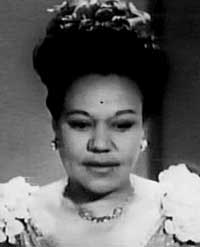 There's a number sung by the emcee Miss Page, i.e., Gertrude Saunders, a pretty good blues singer. Better known as a Bessie Smith song, Gertrude does no injury to "Yes Indeed He Do." She sings it with gumption & wit, not as an actual victim: There's a number sung by the emcee Miss Page, i.e., Gertrude Saunders, a pretty good blues singer. Better known as a Bessie Smith song, Gertrude does no injury to "Yes Indeed He Do." She sings it with gumption & wit, not as an actual victim:
"Do my sweet sweet daddy love me? Yes indeed he do/ He don't stay from home all night more than six times a week/ I know that I'm his Sheba, & I know that he's my sheik/ When I ask him where he's been, he grabs a rocking chair/ Then he knocks me down & says it's just a little love lick, dear."
Before it's over she throws in some scat & trills & she's really quite the card, a fine satiric singer.
In all the singing & dancing there hadn't been much need for an actual story, but along the way Betty's talents get her hired in Mabel's USO show, plus Tom catches on to the truth, & of course he doesn't care one whit because he really loves her.
In fact, he is weirdly glad she's a poor girl because that way he can be more certain of keeping her to himself. Methinks jealous control issues may be in that girl's future!
copyright © by Paghat the Ratgirl
|
